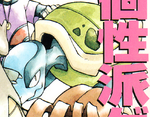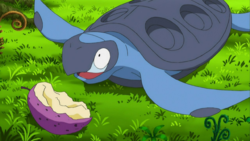From Bulbapedia, the community-driven Pokémon encyclopedia.
Tirtouga (Japanese: プロトーガ Protoga) is a Water/Rock Fossil Pokémon introduced in Generation V.
It is resurrected from a Cover Fossil and evolves into Carracosta starting at level 37.
Biology
Tirtouga is a reptilian Pokémon resembling a baby leatherback sea turtle. Its body is blue with black spots on the edges of its flippers. Its black shell has six circular indentations in it. It has a black upper beak and a mask that covers most of its head. It has a light blue patch underneath its eyes.
Tirtouga's shell is very tough, and it can dive down to depths of as much as 1,000 meters. Tirtouga was known to actively hunt for prey to the extent that it would go on land to reach them. Tirtouga lived in the ancient oceans from about 100 million years ago. It now exists in the present thanks to being revived from fossils. Tirtouga is believed to be the ancestor of most turtle Pokémon.
In the anime
Major appearances
Tirtouga made its main series debut in A Restoration Confrontation! Part 1, where it was befriended by Ferris in the past. The same Tirtouga appeared in the follow-up episode, where it managed to evolve into Carracosta.
Minor appearances
Multiple Tirtouga debuted in White—Victini and Zekrom and Black—Victini and Reshiram.
A Tirtouga appeared in JN058.
Pokédex entries
| Episode
|
Pokémon
|
Source
|
Entry
|
| BW076
|
Tirtouga
|
Ash's Pokédex
|
Tirtouga, the Prototurtle Pokémon. Tirtouga can dive underwater to half-mile depths, and can also attack onshore.
|
|
In the manga
Pocket Monsters BW
A Tirtouga appeared in PMBW12.
Pocket Monsters BW: Good Partners
Two Tirtouga appeared in BWGP05.
Pokémon Adventures
- Main article: Costa
Marshal owned a Tirtouga sometime before arriving in Nimbasa City. Because of his uncontrollable nature, he released him the day before meeting Black and White. He was later caught by Black and nicknamed Costa. Under Black's ownership, he eventually evolved. He first appeared in Growing Pains.
A Trainer's Tirtouga appeared in PS547.
In the TCG
- Main article: Tirtouga (TCG)
Game data
Pokédex entries
| This Pokémon was unavailable prior to Generation V.
|
| Generation V
|
|
Unova
BW: #070
|
|
Unova
B2W2: #126
|
| Black
|
Restored from a fossil, this Pokémon can dive to depths beyond half a mile.
|
| White
|
About 100 million years ago, these Pokémon swam in oceans. It is thought they also went on land to attack prey.
|
| Black 2
|
This Pokémon was restored from a fossil. It swam skillfully and dove to depths beyond half a mile.
|
| White 2
|
|
|
| Generation VI
|
|
Kalos
#—
|
|
Hoenn
#—
|
| X
|
About 100 million years ago, these Pokémon swam in oceans. It is thought they also went on land to attack prey.
|
| Y
|
Restored from a fossil, this Pokémon can dive to depths beyond half a mile.
|
| Omega Ruby
|
About 100 million years ago, these Pokémon swam in oceans. It is thought they also went on land to attack prey.
|
| Alpha Sapphire
|
Restored from a fossil, this Pokémon can dive to depths beyond half a mile.
|
|
|
| Generation VII
|
|
Alola
SM: #194
|
|
Alola
USUM: #241
|
|
Kanto
#—
|
| This Pokémon has no Pokédex entries in Let's Go, Pikachu! and Let's Go, Eevee!.
|
| Sun
|
Based on studies of its skeletal structure, it can apparently dive to ocean depths of over half a mile.
|
| Moon
|
Reputed to be the ancestor of most turtle Pokémon, it lived in warm seas approximately a hundred million years ago.
|
| Ultra Sun
|
It was restored from an ancient fossil. Tirtouga lived in the sea but came up onto the land to search for prey.
|
| Ultra Moon
|
Its hunting grounds encompassed a broad area, from the land to more than half a mile deep in the ocean.
|
|
|
| Generation VIII
|
|
|
Galar
Crown Tundra #147
|
| Sword
|
This Pokémon inhabited ancient seas. Although it can only crawl, it still comes up onto land in search of prey.
|
| Shield
|
Tirtouga is considered to be the ancestor of many turtle Pokémon. It was restored to life from a fossil.
|
|
|
Game locations
| This Pokémon was unavailable prior to Generation V.
|
|
|
|
|
|
|
|
|
In side games
| This Pokémon was unavailable prior to Generation V.
|
|
|
|
|
|
|
In events
Held items
Stats
Base stats
| Stat
|
Range
|
| At Lv. 50
|
At Lv. 100
|
54
|
|
114 - 161
|
218 - 312
|
78
|
|
74 - 143
|
144 - 280
|
103
|
|
97 - 170
|
189 - 335
|
53
|
|
52 - 115
|
99 - 225
|
45
|
|
45 - 106
|
85 - 207
|
22
|
|
24 - 81
|
44 - 157
|
Total: 355
|
Other Pokémon with this total
|
- Minimum stats are calculated with 0 EVs, IVs of 0, and (if applicable) a hindering nature.
- Maximum stats are calculated with 252 EVs, IVs of 31, and (if applicable) a helpful nature.
|
Type effectiveness
| Under normal battle conditions in Generation IX, this Pokémon is:
|
|
|
|
|
|
|
|
|
|
|
|
|
Learnset
|
|
|
|
- Bold indicates a move that gets STAB when used by Tirtouga
- Italic indicates a move that gets STAB only when used by an Evolution of Tirtouga
- Click on the generation numbers at the top to see level-up moves from other generations
|
|
|
|
|
- Bold indicates a move that gets STAB when used by Tirtouga
- Italic indicates a move that gets STAB only when used by an Evolution of Tirtouga
- Click on the generation numbers at the top to see TM moves from other generations
|
|
|
|
|
- Moves marked with an asterisk (*) must be chain bred onto Tirtouga in Generation VIII
- Moves marked with a double dagger (‡) can only be bred from a Pokémon who learned the move in an earlier generation.
- Moves marked with a superscript game abbreviation can only be bred onto Tirtouga in that game.
- Bold indicates a move that gets STAB when used by Tirtouga
- Italic indicates a move that gets STAB only when used by an Evolution of Tirtouga
- Click on the generation numbers at the top to see Egg moves from other generations
|
|
|
|
|
- Bold indicates a move that gets STAB when used by Tirtouga
- Italic indicates a move that gets STAB only when used by an Evolution of Tirtouga
- Click on the generation numbers at the top to see Move Tutor moves from other generations
|
By transfer from another generation
|
|
|
|
- Transferred Pokémon only retain these moves in Pokémon Sword and Shield
- A striped background indicates a generation in which the move can only be obtained via event or as a special move
- Bold indicates a move that gets STAB when used by Tirtouga
- Italic indicates a move that gets STAB only when used by an Evolution of Tirtouga
- × indicates a move that cannot be used in Sword and Shield
- Click on the generation numbers at the top to see transfer-only moves for other generations
|
Side game data
|
|
Pokémon Rumble Rush

|
Walking Speed: 2.33 seconds
|
Base HP: 49
|
|
| Base Attack: 72
|
Base Defense: 54
|
Base Speed: 50
|
|
|
|
|
|
|
|
|
Evolution
Sprites
| This Pokémon was unavailable prior to Generation V.
|
|
|
|
|
|
|
Trivia

Unreleased Pokémon-like design
- Tirtouga and its evolved form are the only Fossil Pokémon to have Rock as their secondary type.
- Tirtouga has a striking resemblance to a Pokémon-like design which appeared in the April 1997 issue of MicroGroup Game Review.
- Tirtouga and its evolved form have only been obtainable with their Hidden Ability in the Pokémon Dream World. Due to the closure of the Pokémon Global Link, they could no longer be obtained with their Hidden Ability except through breeding. The Tirtouga family's Hidden Ability can currently be obtained via the Ability Patch.
Origin
Tirtouga appears to be based on a baby sea turtle, more specifically, a leatherback. It also may be based on Protostega, a large, prehistoric sea turtle that was smaller than the Archelon that Carracosta may be based on.
Name origin
Tirtouga may be a corruption of tortuga (Spanish for turtle, tir having a similar phonetic pronunciation to the tur in turtle) or derived from Tortuga (translated as Turtle Island in French and Spanish). It may also be a corruption of tartaruga, Italian and Portuguese for tortoise, seeing as turtles are closely related to tortoises.
Protoga may be a combination of Protostega (an extinct turtle species largest second to only the Archelon, which its evolution is based on) and tortuga.
In other languages
|
|
| More languages
|
 Russian Russian
|
Тиртуга Tirtuga
|
Transcription of English name
|
 Thai Thai
|
โปรโตกา Protoka
|
Transcription of Japanese name
|
|
|
|
Related articles
External links

|
This Pokémon article is part of Project Pokédex, a Bulbapedia project that aims to write comprehensive articles on each Pokémon species, as well as Pokémon groups and forms.
|


 For other sprites and images, please see Tirtouga images on the Bulbagarden Archives.
For other sprites and images, please see Tirtouga images on the Bulbagarden Archives.









































































